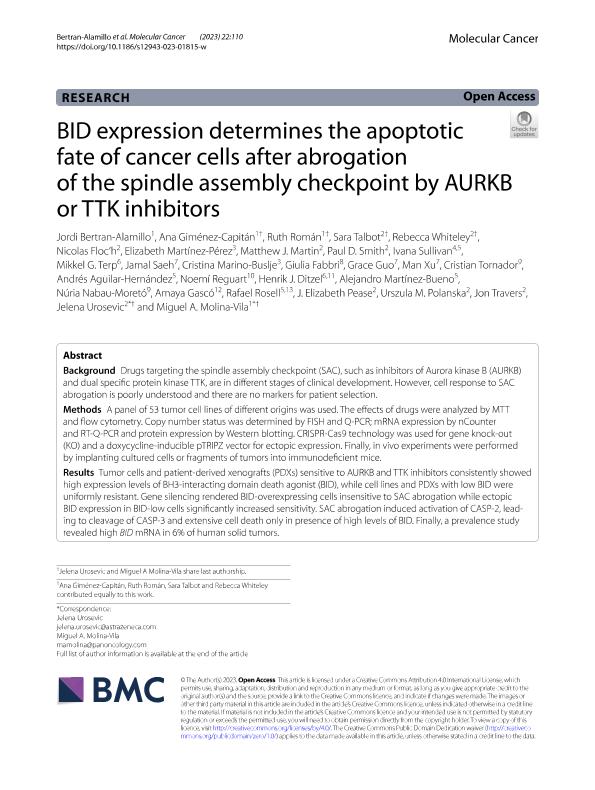Artículo
BID expression determines the apoptotic fate of cancer cells after abrogation of the spindle assembly checkpoint by AURKB or TTK inhibitors
Bertran Alamillo, Jordi; Giménez Capitán, Ana; Román, Ruth; Talbot, Sara; Whiteley, Rebecca; Floch, Nicolas; Martinez Perez, Elizabeth ; Martin, Matthew J.; Smith, Paul D.; Sullivan, Ivana; Terp, Mikkel G.; Saeh, Jamal; Marino Buslje, Cristina; Fabbri, Giulia; Guo, Grace; Xu, Man; Tornador, Cristian; Aguilar Hernández, Andrés; Reguart, Noemí; Ditzel, Henrik J.; Martínez Bueno, Alejandro; Nabau Moretó, Núria; Gascó, Amaya; Rosell, Rafael; Pease, J. Elizabeth; Polanska, Urszula M.; Travers, Jon; Urosevic, Jelena; Molina Vila, Miguel A.
; Martin, Matthew J.; Smith, Paul D.; Sullivan, Ivana; Terp, Mikkel G.; Saeh, Jamal; Marino Buslje, Cristina; Fabbri, Giulia; Guo, Grace; Xu, Man; Tornador, Cristian; Aguilar Hernández, Andrés; Reguart, Noemí; Ditzel, Henrik J.; Martínez Bueno, Alejandro; Nabau Moretó, Núria; Gascó, Amaya; Rosell, Rafael; Pease, J. Elizabeth; Polanska, Urszula M.; Travers, Jon; Urosevic, Jelena; Molina Vila, Miguel A.
 ; Martin, Matthew J.; Smith, Paul D.; Sullivan, Ivana; Terp, Mikkel G.; Saeh, Jamal; Marino Buslje, Cristina; Fabbri, Giulia; Guo, Grace; Xu, Man; Tornador, Cristian; Aguilar Hernández, Andrés; Reguart, Noemí; Ditzel, Henrik J.; Martínez Bueno, Alejandro; Nabau Moretó, Núria; Gascó, Amaya; Rosell, Rafael; Pease, J. Elizabeth; Polanska, Urszula M.; Travers, Jon; Urosevic, Jelena; Molina Vila, Miguel A.
; Martin, Matthew J.; Smith, Paul D.; Sullivan, Ivana; Terp, Mikkel G.; Saeh, Jamal; Marino Buslje, Cristina; Fabbri, Giulia; Guo, Grace; Xu, Man; Tornador, Cristian; Aguilar Hernández, Andrés; Reguart, Noemí; Ditzel, Henrik J.; Martínez Bueno, Alejandro; Nabau Moretó, Núria; Gascó, Amaya; Rosell, Rafael; Pease, J. Elizabeth; Polanska, Urszula M.; Travers, Jon; Urosevic, Jelena; Molina Vila, Miguel A.
Fecha de publicación:
12/2023
Editorial:
BioMed Central
Revista:
Molecular Cancer
ISSN:
1476-4598
Idioma:
Inglés
Tipo de recurso:
Artículo publicado
Clasificación temática:
Resumen
Background: Drugs targeting the spindle assembly checkpoint (SAC), such as inhibitors of Aurora kinase B (AURKB) and dual specific protein kinase TTK, are in different stages of clinical development. However, cell response to SAC abrogation is poorly understood and there are no markers for patient selection. Methods: A panel of 53 tumor cell lines of different origins was used. The effects of drugs were analyzed by MTT and flow cytometry. Copy number status was determined by FISH and Q-PCR; mRNA expression by nCounter and RT-Q-PCR and protein expression by Western blotting. CRISPR-Cas9 technology was used for gene knock-out (KO) and a doxycycline-inducible pTRIPZ vector for ectopic expression. Finally, in vivo experiments were performed by implanting cultured cells or fragments of tumors into immunodeficient mice. Results: Tumor cells and patient-derived xenografts (PDXs) sensitive to AURKB and TTK inhibitors consistently showed high expression levels of BH3-interacting domain death agonist (BID), while cell lines and PDXs with low BID were uniformly resistant. Gene silencing rendered BID-overexpressing cells insensitive to SAC abrogation while ectopic BID expression in BID-low cells significantly increased sensitivity. SAC abrogation induced activation of CASP-2, leading to cleavage of CASP-3 and extensive cell death only in presence of high levels of BID. Finally, a prevalence study revealed high BID mRNA in 6% of human solid tumors. Conclusions: The fate of tumor cells after SAC abrogation is driven by an AURKB/ CASP-2 signaling mechanism, regulated by BID levels. Our results pave the way to clinically explore SAC-targeting drugs in tumors with high BID expression.
Archivos asociados
Licencia
Identificadores
Colecciones
Articulos(IIBBA)
Articulos de INST.DE INVEST.BIOQUIMICAS DE BS.AS(I)
Articulos de INST.DE INVEST.BIOQUIMICAS DE BS.AS(I)
Citación
Bertran Alamillo, Jordi; Giménez Capitán, Ana; Román, Ruth; Talbot, Sara; Whiteley, Rebecca; et al.; BID expression determines the apoptotic fate of cancer cells after abrogation of the spindle assembly checkpoint by AURKB or TTK inhibitors; BioMed Central; Molecular Cancer; 22; 1; 12-2023; 1-24
Compartir
Altmétricas



